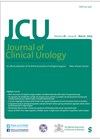
Journal Reviews
Prostate cancer detection in younger men
Prostate cancer (PC) screening using prostate-specific antigen (PSA) testing with systematic biopsy (SBx) reduces mortality but risks overdiagnosis and unnecessary biopsies. Multiparametric MRI (mpMRI) enables MRI-targeted biopsy (TBx) of suspicious lesions and is now recommended before biopsy, although its role...
The case against omitting systematic biopsy in younger men
In this issue of European Urology, Al-Monajjed et al. report findings from the PROBASE trial, which evaluated prostate cancer (PC) detection in men aged 45–50 years with PSA ≥3ng/ml using both MRI-targeted biopsy (TBx) and systematic biopsy (SBx). Among 525...
Multiparametric MRI with targeted-only biopsy – a new standard?
In this issue of European Urology, Kasivisvanathan et al. present a meta-analysis of two randomised trials comparing prebiopsy MRI with targeted biopsy (TBx) alone versus standard transrectal ultrasound-guided biopsy (TRUS-Bx) in biopsy-naïve men at risk of prostate cancer. Their findings...
The cost of bladder cancer: what can be done?
The rising cost of cancer care is a growing concern for health systems. A 2020 study estimated Europe’s annual cancer-related expenditure at €199 billion, with €109 billion attributed to healthcare costs. Bladder cancer (BC), in particular, imposes a significant financial...
Percutaneous nephrolithotomy: wisdom, dogma, paradigm and myths
A non-transpapillary technique appears to ease access to the kidney – the most critical step in percutaneous nephrolithotomy (PNL) – when compared to the classic transpapillary approach. Remarkably, the earliest descriptions of percutaneous access by Goodwin et al. in 1955...
Management dilemma for very high-risk non–muscle-invasive bladder cancer
The European Association of Urology (EAU) guidelines recommend upfront radical cystectomy (RC) for very high-risk (VHR) non-muscle-invasive bladder cancer (NMIBC). However, real-world adoption is limited, as most patients are reluctant to undergo immediate bladder removal. The EAU 2021 risk model...
Disconnect between clinical trials and real-world oncology patients
Clinical trials are essential to advancing cancer treatment, providing the evidence needed to approve new therapies and improve patient outcomes. However, the strict eligibility criteria used – especially in prostate cancer trials – often exclude real-world patients. These criteria prioritise...
Preoperative risk stratification of high-risk prostate cancer patients
High-risk prostate cancer (HRPCa) is associated with a significant risk of recurrence after radical treatment. While several classification systems exist, the D’Amico criteria – based on clinical T stage ≥T2c, prostate specific antigen (PSA) ≥20 ng/mL, or Gleason score (GS)...
Malignant upper urinary tract obstruction: emergency presentations and long-term outcomes
Malignant upper urinary tract obstruction (MUUTO) is a frequent emergency urological referral, often necessitating kidney drainage to preserve renal function. However, many patients have advanced cancer with limited life expectancy, raising questions about intervention benefits. While percutaneous nephrostomy (PCN) or...
Oncological benefits of extended pelvic lymph node dissection
Touijer and colleagues present extended follow-up results from a large randomised trial comparing limited pelvic lymph node dissection (l-PLND) and extended PLND (e-PLND) in prostate cancer patients undergoing radical prostatectomy. The study aimed to assess whether e-PLND, which includes external...
Anti-VEGF and PD-1 combinations in renal cell carcinoma
Over the past decade, vascular endothelial growth factor (VEGF) tyrosine kinase inhibitors (TKIs) have been central to treating renal cell carcinoma (RCC), with oncologists refining dosing strategies to balance treatment efficacy with quality of life (QoL). Recently, the introduction of...
Defining adjuvant, consolidative, and salvage treatment after RP
The most common oncologic outcome following radical prostatectomy (RP) for localised prostate cancer is achieving undetectable prostate-specific antigen (PSA) levels (<0.1 ng/ml), indicating an absence of detectable disease. However, the landscape of RP is shifting as active surveillance becomes the...







